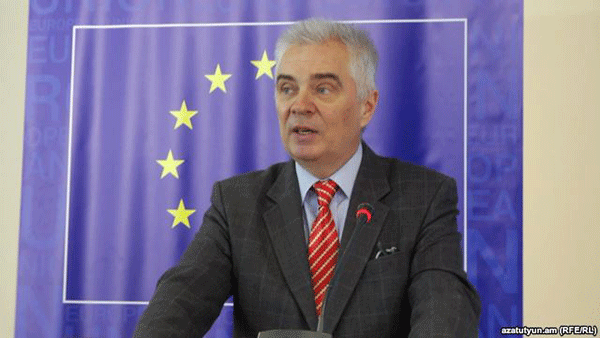The European Union and Armenia are close to concluding negotiations on a new agreement to deepen their political and economic ties, a senior EU diplomat said on Tuesday.
Piotr Switalski, the head of the EU Delegation in Armenia, told RFE/RL’s Armenian service (Azatutyun.am) that the two sides will hold another round of talks in Yerevan later this week. “These are the final moments of the negotiations,” he said.
The planned accord will serve as a substitute for an Association Agreement negotiated by Armenian and EU officials in the summer of 2013. President Serzh Sarkisian precluded its signing with his unexpected decision in September 2013 to seek Armenia’s accession a Russian-led alliance of ex-Soviet states.
The framework deal is expected to contain the main political and some economic provisions of the cancelled Association Agreement. But it will have no free trade-related component due to Armenia’s membership in the Eurasian Economic Union (EEU).
Read also
Switalski would not be drawn on possible dates for the signing of the new deal reflecting Yerevan’s desire to forge closer links with the West even after the 2013 U-turn. The diplomat did note, though, that an Armenian deputy foreign minister “was not far from the truth” when he said recently that it will likely be signed in the first quarter of this year.
Switalski said the two sides only need to agree on “several issues” relating to the Armenia-EU cooperation framework. He declined to disclose those issues, saying only that some of them will require a “political decision.”
Asked which side needs to make such a decision, he said: “It’s a process of mutual give and take. Nobody is talking about unilateral concessions.”
Sarkisian reaffirmed his government’s commitment to deepen ties with the EU when he met with the EU’s commissioner for European neighborhood policy, Johannes Hahn, in Yerevan in November.
According to Armenian government data, the EU accounted for almost 24 percent of Armenia’s foreign trade in January-November 2016, making the 28-nation bloc the country’s second most important trading partner after Russia.





















































